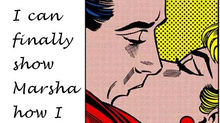Rosencrantz and Guildenstern are Dead and Hamlet is Petrified
- lastcathar
- Feb 25, 2015
- 4 min read
Hamlet is perhaps the most recognized name in the world, a play everyone knows. There is a danger in being old and famous: Hamlet is starting to get typecast. He's starting to petrify.
The play has come to represent the primo example of Shakespearean Theater. But along the way it has calcified. It has now become merely a decoration on the list of accomplishments for directors and actors to pay homage to the Bard in the coin of the Shakespearean Theater Realm: serious, plodding, and boring performances by superstars with English accents, actors who have grown too old for the part yet take it anyway, presumably to prove they haven't. Think of the big names that’ve done Hamlet. Olivier, Day-Lewis, Burton, Fiennes…they were old dudes. Hamlet is a teenager. AH! There’s the rub.
Edwin Booth (37 in 1870)
Laurence Olivier (41 in 1948)
Richard Burton (40 in 1965)
Daniel Day-Lewis, (38 in 1995)
Ralph Fiennes (33 in 1995)
Ophelia is played by young actresses, of course, but Hamlet hits the stage or screen at about the same age as his mother and all the other old croakers who hang around Elsinore. And he settles in comfortably. This is a play where nobody should be comfortable...including the audience.
Hamlet always seems right at home in the castle, and this simply misses the entire set-up of the story. He should be played as an outsider. For one thing, Hamlet is fresh back from school. He has tasted independence, and coming home to Elsinore, well, as we all know, home just isn't the same after you’ve been on your own for a while.
In Hamlet’s case, his father’s death makes home even more foreign. His mother is still there, but she too is not the same, married now to the sleazy uncle. In short, everything has changed. Home is not his home anymore. Hamlet is young and idealistic in a castle full of old guys who are very stuck in their old ways, and scoundrels to boot.
Hamlet alone sees the ghost and, trusting no one, isolates himself even more. As he drifts deeper into the murky waters of the soul, he embraces insanity in order to do the ghost’s bidding. This cuts his last connection to dry land, and Ophelia, unable to follow, drowns in his mud. Well, folks, this is frantic stuff, not pensive, not moody. Hamlet is played far too thoughtfully, not because of an intellectually cutting-edge interpretation of the script, but because the old actors who get the part prefer to stand still and speak their lines in a way that will show what great actors they are rather than act like crazy teenagers.
But let me get to the heart of the matter: The soliloquy. It has never been done right, ever. It is rightly considered one of the Bard’s great speeches, but nobody has ever been allowed to hear it because it is always delivered by an old actor who's been told to avoid over-exertion. It is played as a thoughtful moment, something old actors just love, the reflective aside from the action.
This is all wrong. For one thing, quiet, reflective moments are something that never happen with teenagers, as the Bard (judging by the lines he provides) well knew. At that point in the play, Hamlet has been forced into secretive self-restraint, solitude, and silence about his suspicions and his torments...all for too long. Finding a moment all by himself, he would not wax thoughtful. He's already had too much of that. Given the chance at a true soliloquy, Hamlet would be doing what any crazy teenager would be doing: screaming his head off.
Look at the words Shakespeare has given him: they are not pensive words, they are manic, frantic, desperate, jumping to conclusions, dropping one topic and bouncing into the next. This is not Eyore talking, it’s Tigger in a particularly blustery mood.
The Soliloquy should be a very physical performance, agitated, pacing nervously, quick glances to see if anybody is listening, arms flailing, voice angry, pleading, depressed, excited, and absolutely self-delusionally certain of every half-sentence, every unfinished thought, and every jewel of convoluted logic he speaks.
So, all you accomplished directors out there, before attempting a real performance of Shakespeare's masterpiece, get somebody the right age to play the part.
Olivier, above, well, 'nuff said. If you are able to sit through this entire video, send me an e-mail and I will forward to you a coupon good at participating dealers for one latte mocha. You've earned it.
Burton, below, makes a modest effort to move around a little but seems to be worried about falling off the platform, and finally gets worn-out and has to sit.
I suggest if you value your sanity, do not listen to Paul Scofield's everso actorly soliloquy below. Rather, skip to the final, mashup video. After that video, there is a one-question survey to be filled out.
Question: Am I wrong, or is Arnold the only actor ever to play Hamlet convincingly?





























Comments